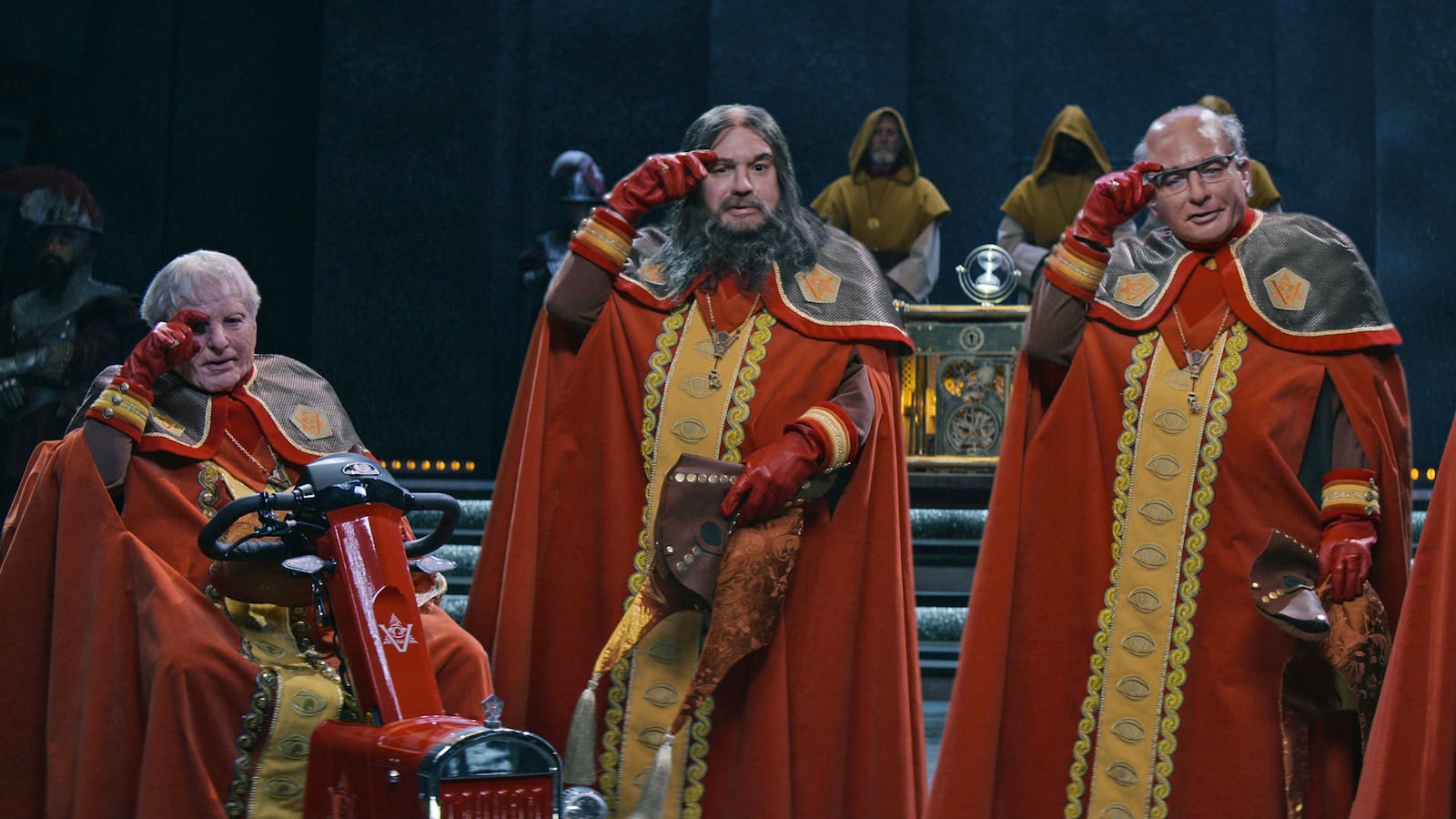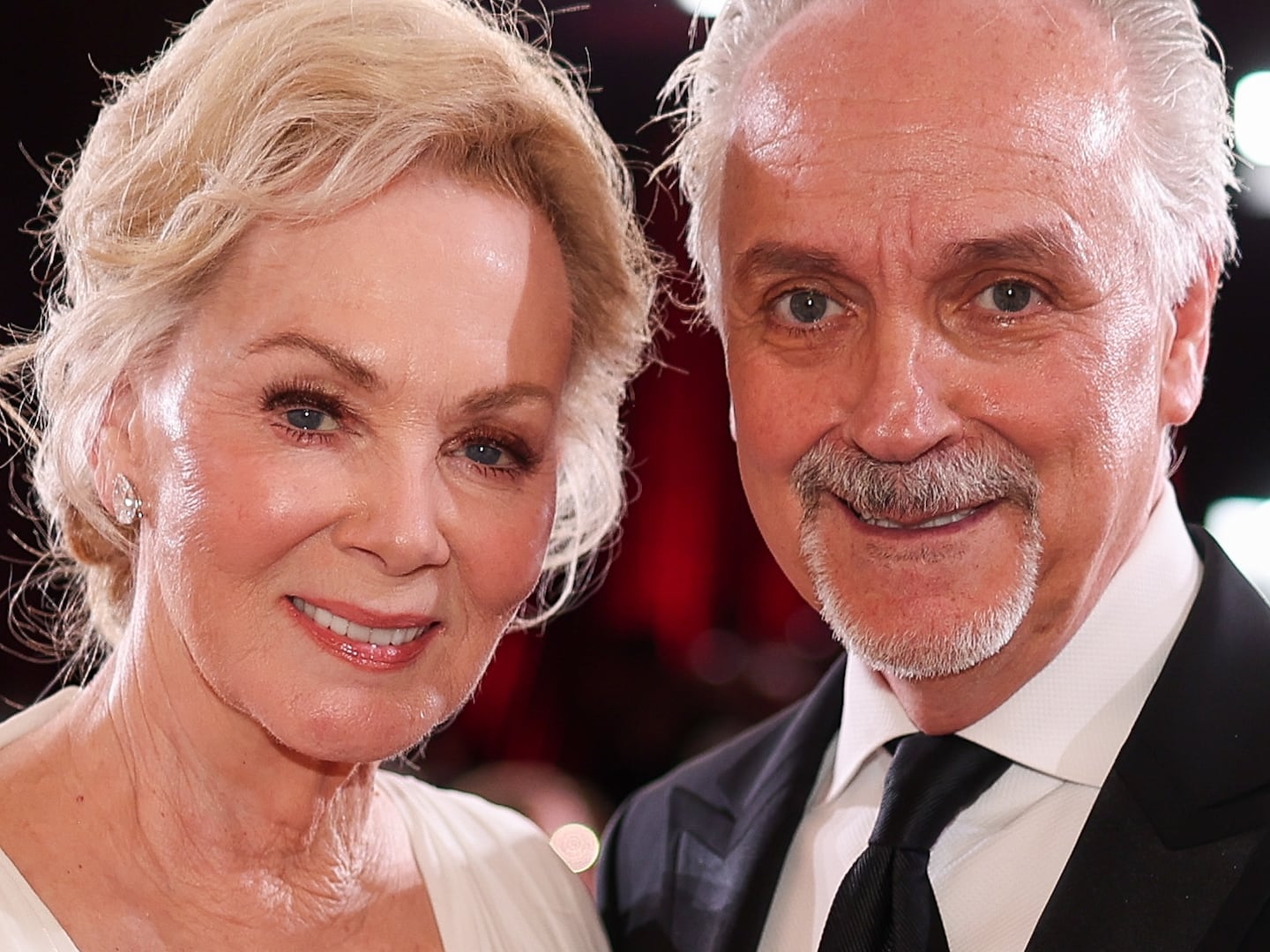The idea for The Pentaverate dates back to 1993—and so too does its humor.
Based on a riff from 1993’s So I Married an Axe Murderer, Mike Myers’ six-part Netflix series (out today) is a return to the former Saturday Night Live star’s Peter Sellers-ish comedic roots, affording him the opportunity to play a variety of disparate characters with prosthetic-make-up faces and exaggerated accents. It’s a routine that once paid blockbuster dividends via the Austin Powers franchise but has been DOA since 2008’s disastrous The Love Guru.
Nonetheless, time hasn’t dimmed Myers’ enthusiasm for this particular brand of nonsense, which is unfortunate given that his latest is a tiresome compendium of half-formed characters, weak social commentary and so many groan-worthy penis and poop jokes that it’s difficult to believe the headliner was once Hollywood’s top funnyman.
The Pentaverate concerns a secret society comprised of five men who rule the world—although their secretiveness seems at odds with the fact that they host an annual meeting in Switzerland called The Meadows that’s attended by the globe’s most influential luminaries, including the Queen of England, Oprah Winfrey, Elon Musk, and Bill Gates. Regardless of this puzzling discrepancy, the Pentaverate are notable for being “nice,” as is explained in credit introductions narrated by an ever-more-irritated Jeremy Irons. This puppetmaster cabal is comprised of British aristocrat Lord Lordington, Russian oligarch Mishu Ivanov, American rock ‘n’ roll manager Shep Gordon, Australian media mogul Bruce Baldwin, and stoner tech guru Jason Eccleston—the last of whom has recently died under mysterious circumstances. Thus, at series’ outset, a new member is recruited: Dr. Hobart Clark (Keegan-Michael Key), a scientist on the verge of solving cold fusion and, with it, climate change.
Save for Key’s Clark, all of these characters are played by Myers, who also embodies the show’s protagonist Ken Scarborough, a Canadian TV journalist whose outdated man-on-the-street reports have put his job in peril. The station Ken works for is called CACA News Toronto, which is emblematic of the level at which The Pentaverate operates, doling out scatological jokes with baffling gusto. From the sight of Sasquatch defecating in a hallway, to subsequent instances of toilet humor and one-liners about having to “drop the kids off at the pool,” the show pads each of its 30-minute episodes with lowest-common-denominator junk ostensibly aimed at man-children. Those viewers are also the apparent target audience for its detours into more blatant wannabe-bold adult territory, most notably with a closing-installment sequence featuring blurred-out male nudity that’s wanly modeled after the genital-obscuring scene from the original Austin Powers: International Man of Mystery.
Quite a few elements strewn throughout The Pentaverate recall Myers’ shagadelic spy films, but a lack of originality is a less pressing problem than a wholesale absence of inspiration. Desperate for a hard-hitting news piece that will keep him employed and relevant, Ken teams with camerawoman Reilly (Lydia West) to visit a conspiracy theory convention where they meet Anthony Lansdowne (also Myers), a New Hampshire wackadoo who drones on about Hillary’s emails, the fact that birds aren’t real, and other insanity peddled by his beloved radio-host idol Rex Smith (Myers as well). Anthony informs Ken and Reilly about the existence of the Pentaverate, and together, this trio embarks on a journey to infiltrate the group, who are simultaneously dealing with a calamity of their own: a murderer in their midst who keeps offing their associates.

After years of occasional small roles in the likes of Inglorious Basterds and Bohemian Rhapsody, Myers is back to his old ways in The Pentaverate, and he certainly hasn’t lost his gift for assuming wildly divergent guises. What he doesn’t have, however, is his finger on the pulse. Collaborating with director Tim Kirkby and writers Roger Drew and Ed Dyson, Myers’ story feels behind the times in terms of its skewering of rampant 21st-century disinformation, cracking jokes about Benghazi and Pizzagate that are at least a few years old at this point, as well as delivering a climactic Vladimir Putin punchline that’s as inapt as his material’s eventual pro-diversity message—because, you see, the Pentaverate are all old white guys!—is lamely dutiful. Our current conspiracy theory-drenched reality has already been mocked to death (see, for example, last year’s very similar Inside Job), and Myers and company find no novel angle with which to attack it, instead name-checking familiar fake news items while juggling a collection of threadbare plots.
Everything about The Pentaverate is stale. There are two weak Stanley Kubrick nods, one an overt shout-out (regarding the Moon landing) and one a Full Metal Jacket homage. There are numerous mentions of a viral internet challenge known as “Kiss the Star” that involves putting lips to anus (the kids call it “a locally sourced rim job!”). There’s a supercomputer known as Mentor who sounds like a Massachusetts moron (“Basically, I’m wicked smart”). There’s a cornball moment in which Myers rehashes his performance of (and simultaneously reunites with) Shrek. There’s even a joke at the expense of Donald Rumsfeld, and a later one revolving around a Bush-Cheney ’04 T-shirt, both of which have been transported in from two decades ago. Throw in a steady stream of mirthless wordplay gags that pivot around sexual innuendo or foreign enunciation, and you’ve got a slog that, no matter its brief runtime, wildly overstays its welcome.
To be fair, The Pentaverate does have one or two clever bits up its sleeve, such as an aesthetic switch to denote the difference between Canada and America, and a monologue about the illogicality of phrases like “unprovoked shark attack” and “ATM machine.” Yet those examples are few and far between during the course of this miniseries, whose narrative is thin and patchy, and whose characters are neither developed enough to make one care about them (i.e. Ken and Reilly), nor imbued with a gonzo personality that might result in actual laughter (i.e. the rest of Myers’ roles). At his peak, Myers knew how to meld both those elements in a single hero or villain, but The Pentaverate is confirmation that the star’s 14-year hiatus from this schtick-y type of undertaking hasn’t served him well.






